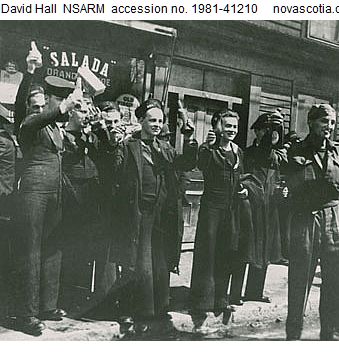Ross Eberlee served in the Royal Canadian Navy during the Second World War. In his testimony, he recounts getting the message that Germany surrendered while at sea.
Please be advised that Memory Project primary sources may deal with personal testimony that reflect the speaker’s recollections and interpretations of events. Individual testimony does not necessarily reflect the views of the Memory Project and Historica Canada.
Transcript
Took my basic training of course on the Plains of Abraham in Quebec City and I knew the Canadian history and I was kind of thrilled about that. Went to sea right away, the [HMCS] Coaticook was in an escort group, EG27 with a total of five frigates, some new, some old. And the moment you’re out of the harbour on your first trip, you were at war. And many ships had been sunk at the gateway of Halifax Harbour and really not aware of it until later on, people onboard ship said, well, that’s probably one of the dangerous spots in going to sea, is just outside the harbour of Halifax. During that period, we had quite a few action stations. And these action stations, if I weren’t in my office, as a telegrapher or in the holds of the ship, handing up ammunition without any ear protection whatsoever. And it was like being in a tin can. The banging and the booming and the shuddering and everything was all felt and I really wasn’t there to see what was going on, which disappointed me more than anything. However, we were never struck by the enemy. It was just a very few days later that we were still living onboard ship that the captain called us on deck and they asked for volunteers to go for Pacific duty. And if you did that, they’d give you 30 days leave. They didn’t say when but they said they’d give it to you. So, most of the men onboard our ship and in the whole group said they’d be willing to go to the Pacific. Some didn’t. Probably some of the older men who were glad the war was over. And so our group, Escort Group 27 started out for the Panama Canal. Pulled into Esquimalt [British Columbia] and the ship was to be tropicalized. That is, it was to be refit with equipment and improved the ship for tropical weather, for Pacific duty. During that time, the ship was in and out of the harbour and we had one direction to go north of the Vancouver Island because there had been word that there was possibly Japanese ships in that area, submarines. And after several days search, we returned to Esquimalt, the whole escort group went there, the five ships, and no sign of any Japanese activity at all. In August [1945], the atom bomb was dropped and I was on the main street with all the people gathering, talking about the atom bomb and the end of the war with Japan. That was very exciting. Right at the end of the war, I was at sea. And I had received some messages, naval messages, that were, some of them posted “Most Immediate”. And I took those messages and here’s one that’s dated the eighth of May, 1945. And that was VE Day. And this one was called “Most Immediate Naval Message” and it said: “The German High Command has surrendered unconditionally all German land, sea and air force in Europe, effective from 00:01 B hour. Repetition, 00:01 B hour, ninth, repetition ninth of May, from which our all offensive operations are to cease. Item two, due to difficulties of communications, there may be some delay in these orders reaching enemy forces. Accordingly, danger of attack by individual surface craft, U-boat and aircraft may persist for some time to come. Signed, Admiralty.” To a great degree, I enjoyed myself in the navy. I enjoyed the fellowship, I grew up. I got that father image that I needed, that image of authority that I responded to and I have become a better person for it.

 Share on Facebook
Share on Facebook Share on X
Share on X Share by Email
Share by Email Share on Google Classroom
Share on Google Classroom





